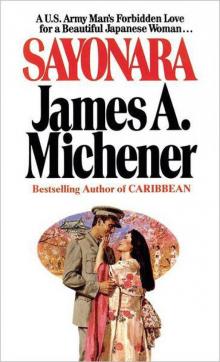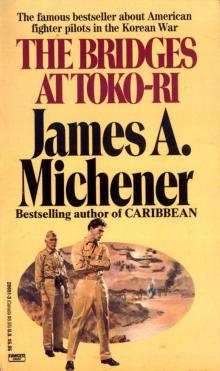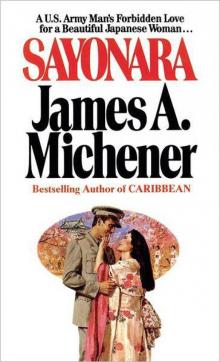- Home
- James A. Michener
Hawaii Page 7
Hawaii Read online
Page 7
So when Teroro convened his bewildered companions to dream up some new fantasy, Mato spoke first: “We must go back to Bora Bora and plan our revenge.”
“We’ll go back and work out a plan,” shark-faced Pa seconded.
With the decision taken from his hands Teroro could only mutter, “We will have revenge! That we will have!” and thinking only of some utter destruction and disaster, he bided his time.
WHEN A CONVOCATION ended, the priests wisely withdrew and encouraged the population to release its tensions in a wild, spontaneous celebration that sometimes lasted for three days. Now women were free to join their men, and musicians crowded the night with echoes. Beautiful girls, flashing bits of brown radiance dressed in skirts of aromatic leaves, swept into the mad hula of Havaiki and danced provocatively before the visitors of other islands, as if to challenge: “Do the women of Tahiti have soft breasts like ours? Can they move their knees to music the way we can?”
One spectator watched the dances and muttered to himself, “May the women of Havaiki be damned.” Teroro would take no part in the celebration. Neither the magic hammering of the excited drums, nor the sweet voices of older women chanting love songs, nor the beauty of the girls enticed him to join the dancers. When special beauties, their bodies illuminated by palm-frond torches and etched in smoke from the fires where pigs roasted, danced past him in direct invitation, he would look at the ground and mutter to himself, “I will destroy this island. I will kill every priest of Oro. I will desolate …”
His men could not maintain such powerful resolve. One by one the young chiefs threw aside their spears, wiped their hands on their bare chests and leaped into the dancing circle, shouting and entering into the wild gyrations of the Havaiki hula. When they had driven themselves into an ecstasy, they would leap high into the air, slap their thighs and prance for a moment before their equally frenzied partners. Then each would pause, look at the other, and break into laughter, whereupon the girl would unconcernedly start to walk idly toward the shadows, her partner following with equal unconcern until at the last they gave a cry and rushed together to the seclusion of some protected glade.
As they disappeared, old women in the chanting circle were free to shout encouragement, usually of the grossest kind, at which the general audience roared with approval.
“He’ll be tired before she is!” one old woman predicted.
“Show him what Havaiki’s famous for, Rere,” another screamed.
“Don’t let him stop till he begs for mercy,” the first added.
“Auwe!” another cried. “Make the moon hide its face for shame!”
“Remember what I taught you, Rere!” the first chanter shouted. “Don’t make him do all the work.”
When the advice became almost unbearably clinical, the general audience collapsed into gales of merriment, the music halted, and everyone rolled about the earth in animal joy. What delight the wildness of sex brought with it. Then the tiniest drum—no more than eight inches of hollowed-out branch beaten with a wand—would begin a wild, high rhythm that could almost compel a man to dance, and larger drums would pick it up, and soon some other of Teroro’s men would begin dancing with a dark Havaiki girl, and they too would go into the shadows accompanied by ribald advice from the lusty old women, for an island hula was meaningless unless at its climactic moment a man and woman so desired each other that they were propelled explosively into fulfillment.
Teroro alone was not captured by the mystery and joy of this night. He did not even look up when the leading heckler shouted, “I always thought there was something wrong with the men of Bora Bora. Tetua, dance over there and tell me if he’s capable!” A marvelous young girl of fifteen danced almost on Teroro’s toes, flashing her body very close to his. When he ignored her, she ran laughing into the middle of the fire-rimmed circle and shouted, “He can’t do!”
The old woman cackled above the drums, “I keep wondering how they have babies on Bora Bora. Men from Havaiki must swim over at night!”
At this sally Teroro had to look up, and against his will he had to smile at the raucous old woman, for islanders loved wit and liked to acknowledge it, even when directed against themselves. The old chanter, seeing that she had pierced Teroro’s indifference, cried passionately, “Auwe! If I were only twenty years younger, I’d explain to you what men were made for!” When the crowd roared she shouted, “I can even yet!” And she started an outrageous hula, moving toward Teroro with her white hair dancing in the night and the memory of great sexual feats animating her hips. She was prepared to make a great fool of Teroro, but at this moment a famous chief of Havaiki, fat Tatai who guarded the temple, appeared and said quietly, “We would like you to eat with us, Teroro.” And he led the young chief away from the fires, but not away from the old woman’s biting tongue, for as the two men disappeared she screamed, “Oh, now I understand. It’s men he likes.”
Fat Tatai laughed and said, “Only death will silence that one’s tongue.” He led Teroro to the outskirts of the village, where his imposing family grounds had for centuries been enclosed on three sides by a rock wall head-high, the fourth side free to open on the ocean. As he entered the enclosure, Teroro saw dimly eight or nine grass houses and he could identify each: the main sleeping hall, the women’s hall, the women’s cook house, and the separate houses for each of Tatai’s favorite wives. It was to the men’s area that fat Tatai took his guest, and there, in moonlight and to the music of waves, the feast was spread.
Teroro had barely finished licking burnt pig fat from his fingers when to the west of the compound a tiny drum, beaten frantically with a length of wood, began its persuasive chatter, followed by the steadier throbbing of several big drums as the musicians entered. “I wonder why Tatai bothered to set such a feast for me?” Teroro mused, pushing away the food. He wandered to a group seated by a fire and watched casually the figures that began to materialize from the night’s soft shadows. They were the women of the Havaiki chiefs, and in tones less raucous than Teroro had recently heard in the village square, they began the haunting strains of old island love songs, and the bitterness went out of his heart:
“When the rolling surf
And the rising moon
And the swaying palm
And the high white bird
And the lazy fish
All speak of love,
I cry in the night:
Where are you, love?”
It was to the strains of this languorous island song that Teroro saw approaching him, in the gentle rhythms of a chief’s hula, a slim, wiry-hipped girl of fourteen with midnight-black hair that fell to her knees. She swayed delicately, her dark eyes fixed on the ground, but when the plaintive old song ended, she raised her right finger about two inches from the fall of her ti-leaf skirt, shimmering in the flares, and indicated a swifter beat, which the drums initiated.
Now she danced on her toes, her knees and elbows out in an excitingly awkward position, with the fronds of her ti-leaf skirt whirling about her handsome legs. In this dance she allowed her face to show, and it was remarkably beautiful, and she brought it close to Teroro’s, her full young breasts almost brushing his hands.
Against his will Teroro gazed back at her dark eyes and for a moment was inspired to leap to his feet and join her in the dance; but he felt that he must ignore Havaiki women, since he would one day destroy this evil place. He felt no burning sexual desire, for on Bora Bora he had always been allowed almost any girl he wanted; like all young chiefs, at puberty he had been handed over to an older woman who had instructed him long and intimately in the proper behavior of men and what pleases women, and it was this preceptor who had selected his first four partners. Later, after long consultations with a genealogist, the instructress had decided that moon-faced Marama was the girl he must marry. “She will fit you appropriately in all ways,” the older woman had decided, and she was right. His subsequent girls Teroro had picked for himself, and sex had been as natural to him as swimming,
so that now he was constrained to ignore the dancing girl before him, except that when he saw the look of intense disappointment on her face he felt ashamed, and against his better judgment, looked at her and smiled. And in that instant he saw her framed against palm trees, with long black tresses glistening in the fires, and on some surging impulse he leaped to his feet, whirled into the dancing area and positioned himself before her, swinging his body in the frenzied postures of the even more erotic Bora Bora hula.
Now the beautiful young girl acted as if she had never seen her new partner before. Dancing impersonally, her eyes far away, she led the drums to faster rhythms until in mounting fire her entire body quivered and a soft glow of perspiration reflected from every angle of her golden brown skin. She bent her knees and danced close to the ground. Then, in the most characteristic passage of the Havaiki hula, she spread her knees as if entertaining a man in love, whereupon the drums retarded their beat to allow her movements to become slow and madly provocative. She closed her dark eyes and held her head far back. With one hand she caught the ends of her hair and passed them between her teeth.
Over her a savagely aroused Teroro danced until with a fiery leap he sprang high into the air, descending with his toes not inches from hers. He now bent his body, spreading his knees, and for at least a minute the two bronzed bodies swayed until a woman shouted, “Auwe!” and the drums rose to new violence and the dancers entered upon the final wild gyrations.
Then, magically, everything stopped. There was dead silence, and the young girl, walking slowly like a sea goddess come ashore, moved demurely toward the shadows that marked the sleeping areas of the compound. When she had vanished, Teroro with maximum indifference stooped to throw a driftwood brand into the fire. Then tardily, like a boy summoned to a temple, he started edging toward the shadows, but this was too much for one of the chief’s women, and she called in a wild, penetrating voice, “Take your skirt off, Tehani, I can’t make you another.”
He found her waiting for him in the far corner of the compound, before a small house which her family had reserved for her on her thirteenth birthday, for island parents encouraged their daughters to experiment with many young men and to learn the ways of love, since potential husbands did not like to marry any girl who had not already proved that she could bear children.
“This is my house,” she said simply.
“What is your name?”
“I am Tehani, Chief Tatai’s daughter.”
“Tehani,” Teroro interpreted. “The little darling.”
The girl laughed nervously and replied, “My mother was beautiful.” With a swift passage of his arm about her hair-hidden waist, Teroro swept Tehani into the air and carried her into her house. Happily, she twisted her long tresses about his face and pressed her lips to his. When he had placed her on the soft pandanus mats she pulled away her skirt of ti leaves and said, “It was my mother who warned me not to tear the skirt.” And she pulled Teroro onto her and wrapped her arms about him, twisted and sought him, pressing him ever more strongly to her. But later, as he lay in the starlight that drifted in through the doorway, he swore to himself: “I will destroy this compound … this whole island.”
But in the morning, after he had eaten in the men’s house, where his adventure with Tehani occasioned no comment, he returned to the girl’s secluded house, and after a while the two lovers began idly toying with the famous Havaiki slapping game, wherein to an ancient chant each gently tapped the other’s finger tips, then shoulders, then sides, then thighs; as the game progressed the slaps grew in intensity, until perversely they dropped away to the tenderest of caresses, so that a gesture which started as a quick slap might end as a long embrace. At last Tehani lingered so gently over one slap, that Teroro caught her skirt and pulled it from her. Completely naked, she continued the game, chanting a few haphazard bars and attempting a few more desultory slaps, now grown breathless and passionate, until with a cry of soft triumph she surrendered the game and rolled into Teroro’s arms, pushing him back onto the matting.
Later she whispered, “This is the way we fight on Havaiki.” When Teroro laughed she asked, “Can girls of Bora Bora fight with their men like this?” Teroro was not pleased with the question, and although Tehani sensed his irritation she nevertheless pursued: “Is it true that on tiny Bora Bora you still pray to Tane?” The manner in which she pronounced tiny and Tane betrayed the contempt with which people of her island had always regarded Bora Bora.
Teroro did not rise to the insult. With studied courtesy he said, “We pray to Oro, which is why, even though we are so small, we invariably defeat Havaiki in war.”
Tehani blushed at the memory of her island’s humiliations and asked, “Did you wonder why my father came for you last night? And why I danced for you?”
“I thought about it. It looked planned.”
“And why I brought you here?”
“At first love-making a man sometimes wonders,” Teroro said. “At the second he no longer bothers.”
“And at the third,” Tehani whispered, “he decides to stay with this girl … to make his home here … to become a man of Havaiki.”
Teroro pulled away and said, “For a warrior there is only one home, Bora Bora.”
It was an ancient island custom that high-born women could seek their husbands, and Tehani now did so. “I plead with you, Teroro. Stay here with me.”
“If you want to be my wife,” he said, “you’ll have to come to my island.”
“You already have a first wife there, Teroro. Live here, and I will be your first wife.”
The young chief held the girl off and studied her marvelous face. “Why do you ask this, Tehani? You could have any man on Havaiki.”
The girl hesitated, then decided to speak the truth. “Your island is doomed, Teroro. You must escape. Come here. Be loyal to Oro. We can have a good life.”
“Has your father suggested this?”
“Yes.”
“What evil is he planning?”
“I dare not say,” she answered. Taking Teroro’s hands, she knelt before him and pleaded softly, “I have shown you how sweet Havaiki could be because I want to save your life. Here you can become a powerful chief. My father has many lands, and Oro is generous to warriors like you.”
“I belong to Bora Bora,” Teroro said with passionate conviction. “I will never leave that island,” and he started for the canoe, but pleading Tehani caught him by the legs, and he stayed with her that second night, so that on the next morning when the conch shells told of departure, he was reluctant to go.
“There are no women like you on Bora Bora,” he confessed.
“Stay here with me,” she pleaded.
At this moment he was almost tempted into confiding to her the revenge he had been formulating in his mind, but he fought back the impulse and said, “If I ever did come back to Havaiki, you would be my woman. A man could enjoy you.”
“Come soon, Teroro, for Bora Bora is doomed.”
Certainly, when the eleven visiting canoes departed the temple and stood out to sea, each breaking off from the column for its own destination, it seemed that the days of Bora Bora’s greatness had vanished, for it was a dispirited group that occupied Wait-for-the-West-Wind. King Tamatoa acknowledged that in the game of power at the temple, he had permanently lost. All strength now lay with the High Priest, and abandonment of the island to Oro was the only sensible course. Teroro, surveying his depleted ranks, brooded on revenge, but had to recognize that the priest had outwitted him and had stricken down enough of his men to demoralize the rest. The crewmen sensed that their chiefs were disorganized and that ultimate power now lay with the High Priest, but they did not know by what political contrivances the power would be transferred; while the junior priests were so excited by the obvious victory of Oro that they had volunteered, while still on Havaiki, to assassinate both Tamatoa and Teroro and thus to settle the island’s problems once and for all.
To their surprise, the High
Priest had not assented to this; in fact, he had condemned his overeager assistants and had reasoned: “If we dispose of the king and his brother in this manner, the people will lament their passing and might even rise against us, but if we continue as we have been doing, then the people themselves will discover that their king is powerless against the wishes of Oro, and they will either force him to Oro’s will, or they will desert him.”
“But what if the king is obstinate?” an old priest had asked, recalling the record of Tamatoa’s father, against whom Havaiki, Tahiti and Moorea had united in war, fruitlessly.
The High Priest had looked up at the sacrifices dangling in the moonlight and had observed: “Tamatoa may remain obstinate, but his people won’t. Have you been watching how his men are even now confused and bitter? Where is Teroro, their leader, right now? Idling in the hut of Tehani!”
The old priest, not certain that Tamatoa would abdicate, had argued: “Whom shall we select to rule Bora Bora if we do depose the king?”
The High Priest had hoped that this question would not be raised, because he did not wish to stand forth among his followers as the originator of a plan that had indeed been devised by the generality of priests, so he had equivocated and said, “Oro has chosen a successor.”
“Who?” the old man had pressed.
“Oro has chosen Tehani’s father, the great chief Tatai.”
There had been a long silence as the enormity of this decision struck the priests, for they were Bora Bora bred, and what was proposed was nothing less than the submission of their island to the ruling house of Havaiki, a thing never accomplished in the past by siege or war or contrivance. The High Priest had known that this intelligence must at first be repugnant, so before anyone could speak, he had added, “It is Oro who has chosen Tatai.”

 Mexico
Mexico The World Is My Home: A Memoir
The World Is My Home: A Memoir Sayonara
Sayonara Chesapeake
Chesapeake The Novel
The Novel Rascals in Paradise
Rascals in Paradise Return to Paradise
Return to Paradise Presidential Lottery: The Reckless Gamble in Our Electoral System
Presidential Lottery: The Reckless Gamble in Our Electoral System The Source
The Source Poland
Poland Space
Space Caravans
Caravans Creatures of the Kingdom: Stories of Animals and Nature
Creatures of the Kingdom: Stories of Animals and Nature Iberia
Iberia Hawaii
Hawaii The Watermen: Selections From Chesapeake
The Watermen: Selections From Chesapeake Report of the County Chairman
Report of the County Chairman The Covenant
The Covenant The Bridges at Toko-ri
The Bridges at Toko-ri Matecumbe
Matecumbe Journey: A Novel
Journey: A Novel Centennial
Centennial Sports in America
Sports in America Texas
Texas Miracle in Seville
Miracle in Seville This Noble Land: My Vision for America
This Noble Land: My Vision for America Tales of the South Pacific
Tales of the South Pacific Bridges at Toko-Ri
Bridges at Toko-Ri Space: A Novel
Space: A Novel Presidential Lottery
Presidential Lottery Sayonara: A Novel
Sayonara: A Novel This Noble Land
This Noble Land The Covenant: A Novel
The Covenant: A Novel Miracle in Seville: A Novel
Miracle in Seville: A Novel The Bridge at Andau
The Bridge at Andau Source
Source The Source: A Novel
The Source: A Novel Journey
Journey Recessional: A Novel
Recessional: A Novel Legacy: A Novel
Legacy: A Novel The Bridges at Toko-Ri: A Novel
The Bridges at Toko-Ri: A Novel Poland: A Novel
Poland: A Novel